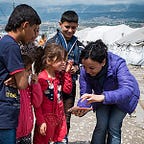APC 2018 — Agenda
What to expect from the APC 2018– 6 & 7 December 2018 | 9.00–17.00 GMT+1
All sessions will be web streamed (day one, day two).
6 December (webcast)
Venue: Auditorium, World Food Programme, Via Cesare Giulio Viola 68 Rome
08:00–09:30 Registration
9.30–10.00 Welcome and Opening remarks
- Valerie Guarnieri, Assistant Executive Director, Operations Services Department, WFP
- Giammichele De Maio, Chief, NGO Unit, WFP
Master of Ceremony: Bettina Lüscher, Chief Spokesperson, WFP Berlin
10.00–13.00 Effectively preventing and responding to sexual exploitation and abuse
10.00–10.05 Introduction to keynote
Bettina Lüscher
10.05–10.25 Keynote
Richard Corbett, Humanitarian Lead, Oxfam GB
10.25–10.30 Introduction to panel
Bettina Lüscher
10.30–10.45 Putting affected people first: raising awareness on SEA and building trust in communities.
Moderator: Valerie Guarnieri, Assistant Executive Director, Operations Service, WFP
- Rachel Wolff, Response Director for the Rohingya Refugee Response, World Vision International
- Nadine Grant, Vice President, International Programs and Business Development, Plan International Canada
- Patricia McIlreavy, Vice President of the Humanitarian Policy and Practice, InterAction
10.45–11.00 Panel discussion
11.00–11.30 Coffee break
11.30–11.50 Being Accountable: Responsibilities Towards People Affected by SEA
Introduction to panel: Bettina Lüscher
Moderator: Valerie Guarnieri
- Michael Hyden, Director of Programmes, ICVA Network
- Patricia Kiko Harvey, Inspector General, WFP
- Wendy Cue, PSEA/SH Focal Point for Inter-Agency Standing Committee (IASC) Secretariat
11.50–12.00 Panel discussion
12.00–12.50 Q & A
12.50–13.00 Summary of take-aways and closing remarks
13.00–13.05 Group photo
13.05–14.00 Lunch break
14.00–17.00 Leading humanitarian interventions: Lessons learned from Yemen, Bangladesh and the Syria regional response
Moderator: Justin Byworth, Global Humanitarian Director, World Vision International
14.00–14.30 Panel remarks
Yemen:
- Arif Husain, Chief Economist and Deputy Director of Policy and Programme, WFP
- Inge Breuer, Head of Programme, WFP Yemen
- Julien Schopp, Director of Humanitarian Practice, InterAction
14.30–15.00 Q & A
15.00–15.15 Coffee break
15.15–15.45 Panel remarks
Bangladesh:
- Lewis Temple, Chief Executive Officer, BRAC UK
- Mark Pierce, Bangladesh Country Director, Save the Children
- Janerose Alvers, Head External Relations and Communications, WFP Bangladesh
Syria:
- Khaled Erksoussi, Secretary General, Syrian Arab Red Crescent (SARC)
- Ahmed Zakaria, Head of Programme, WFP Syria
15.45–16.50 Q & A
Questions for discussion:
- Do we have the presence and the coverage at the level needed?
- How can we make sure we have access and we are reaching the right people?
- How can we all better contribute to the Food Security Cluster?
- How can we provide better complementarity of roles and maximum efficiency (cost and speed)?
- Have we improved in linking early warning and early action?
- Where do we have good examples of linking lifesaving and resilience building actions?
16.50–17.00 Summary of take-aways and closing remarks
17.00–17:15 Closing of Day one
17.30–18.30 Cocktail reception
Red Café, WFP
7 December (webcast)
09.00–9.15 Day One recap
9.15–10.45 Transforming how we address acute malnutrition
Moderator: Lauren Landis, Director, Nutrition, WFP
9.15–9.35 Keynote remarks
- Mesfin Teklu Tessema, Senior Director, Health, International Rescue Committee
9.35–10.05 Panel discussion
- Anne-Dominique Israel-de Monval, Senior Nutrition and Health Advisor, Action Against Hunger
- Casey Harrity, Head of Humanitarian Programs, Save the Children US
- Nancy Aburto, Chief, Nutrition Specific Team, Nutrition Division, WFP
10.05– 10.45 Q & A and summary of take-aways
Questions for discussion:
- How can we achieve greater impact to address acute malnutrition? What joint actions need to be put in place?
- How can we fill the knowledge gap?
10.45–11.00 Coffee break
11.00–12.30 School Feeding: new evidence and the Global Coverage Gap
11.00–11.15 Keynote
Prof. Donald Bundy, London School of Hygiene and Tropical Medicine
11.15–11.25 WFP remarks
Carmen Burbano, Director, School Feeding Division, WFP
12.25–12.35 Q & A
11.35–12.30 Interactive dialogue on key questions:
- We know 73 million children are in need of school feeding — How can we best position school feeding as a priority in the international community?
- What do you think are the biggest challenges to bridge the gap until 2030?
- If we think of school feeding as a platform — What complementary programs do you know or even implement yourself that should be integrated?
- What operational arrangements do we need, to strengthen our partnership and better work together to achieve our goal?
12.30–13.30 Lunch break
13.30–17.00 Building resilience in the Sahel region
Moderator: Mark Gordon, Chief, Asset Creation and Livelihoods, WFP
13.30–14.00 Panel discussion
- Robert Kaufman, Deputy Regional Director for Africa, IFRC
- Wagdi Othman, Senior Government Partnerships Officer, Regional Bureau for West Africa, WFP
- Mutinta Hambayi, Chief, Nutrition Sensitive team, WFP
14.00–14.30 Q & A
14.30–15.00 Coffee break
15.00–15.45 Working groups on following questions.
Key questions for discussion:
- What can be done in the next 12 months to invest in the capacity of local actors and systems?
- How do we assist the advocacy of the multi-year programmes and invest in building resilience given the complexity and inter/intra sensitivity of shocks and stressors?
- What can WFP and its NGO partners do together to smooth administrative and financial processes at the field level to improve programme quality?
- How do we protect/strengthen resilience activities alongside shorter-term emergency responses?
15.45–16.40 Reporting back from working groups and follow-up discussions
16.40–17.00 Summary of take-aways
17.00–17:15 APC summary of conclusions and closing remarks
Valerie Guarnieri, WFP
